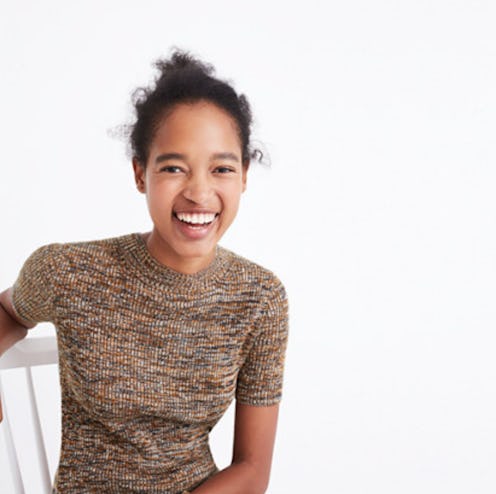Style
Everyone Is Pissed At Madewell For This Black Model's Hair, But There May Be More To The Story
J.Crew and it's subsidiary brand Madewell are facing widespread criticism after controversial photo of one of the brand's models went viral. The model, who is wearing a Madewell dress, has unkempt hair in a natural style that looks like it hasn't been brushed. It's not clear when the images were posted on the site, but a tweet calling out the brand was shared Nov. 9, and it's racked up more than 20,000 likes and 10,000 retweets. People are upset that J.Crew seemingly put little effort into styling the model's hair. As Twitter user @michellerouche wrote, "She is a beautiful woman but her hair is a hot mess."
J.Crew issued an apology via its official Twitter profile. The model has since been identified by Revelist as Marihenny Pasible. Bustle has reached out to both J.Crew and Pasible for comment, but has not heard back.
For all intents and purposes, Pasible looks carefree and beautiful in all of the pictures on the product page, but her hairstyle left me with questions — many of which I wasn't expecting to ask.
At first, I was outraged. It seemed as if yet another brand was showing its ignorance about Black hair (per Pasible's Instagram profile, she is from the Dominican Republic). Would it have been that hard to have a stylist familiar with natural hair at this photo shoot? I initially thought the Twitter campaign against J.Crew was completely justified.
However, there's an important part of this that I almost overlooked: The model seems to be okay with the pictures. She left an Instagram comment on gossip site The Shade Room's post about the controversy, essentially saying she didn't understand the outrage. Pasible said she was flattered by the attention but didn't think Madewell did anything wrong.
"The concept of the brand specifically is to show that clothes can be comfortable wearable and naturally beautiful," she wrote. "So the natural hair and makeup fits right in. Also these days it is all about women embracing their natural looks so here it is!"
After reading that, I had to ask myself an uncomfortable question that I'm not quite sure I can answer. Do I have the right as a black woman to be mad on Pasible's behalf, if she's not upset herself?
There's a reason so many women of color had a visceral reaction to these pictures. I've known from the time I was a little girl that walking into a random hair salon would likely end in disaster. There's even a smartphone app to help Black women find stylists who are experienced with their hair texture. When I saw Pasible's pictures, I assumed she'd fallen victim to a white stylist who had no idea how to do her hair — an embarrassing experience I can relate to.
There's also the demonstrated history of brands neglecting to consider things that could alienate women of color from their messaging. Remember the clip from part of a Dove advertisement from October that showed a Black woman becoming white, which was eventually pulled? That same month, Anastasia Beverly Hills was forced to apologize after a swatch mixup made it seem as if a lip color looked drastically different on darker skin.
It's easy to dismiss the Madewell image as a similar situation, but so much of my initial outrage was based on partial information. Most specifically, what if Pasible was involved in the styling process all along, as her Instagram comment seems to imply? If that's the case, shouldn't she be allowed to wear any hairstyle, regardless of what the public thinks? We don't criticize white models with messy hair, so why should this be any different?
I thought this was yet another instance where a major company was showing its woeful ignorance when it comes to natural hair — the Today show getting roasted after styling a Black woman's hair on live television comes to mind — but the actual issue seems to be more complicated. I assumed a number of things — that Pasible hated the hairstyle and didn't speak up for fear of losing the job and the stylist on-set didn't know what he or she was doing — without having many facts.
It's hard to know if we'll get any more info about this controversy since the brand has apologized and the model has spoken out, but I'm taking this as an opportunity to sit back and reflect. Brands have a lot of work to do when it comes to catering to natural Black hair, but if a woman of color chooses to wear her hair in all its natural glory and doesn't smooth it out, it's not really any of our business.
